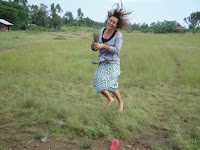 |
| Ondati market |
First, I must say that overall I enjoyed it - despite the rain and the mud - it was a beautiful place, quiet, peaceful, happy (in spite of the poverty).
I met lots of good people and was invited into their homes.
 |
| Nancy - selling tomatoes |
Have I made a difference? What did I achieve? Well, I checked out the cash book, and updated several files, I helped to draft the 2012 budget. I think the principal learnt some new accountancy principles, and I have left him with the beginnings of a Finance Manual, with tips and hints for keeping on top of things.
 |
| Teacher's staff room |
 |
| Inspiring the committee with the Vision and Mission |
I don't think 3 weeks of my time is the answer to all their problems (even with the 2 pads of accountancy paper and several pens, highlighters, and post-its I left behind) but I hope it has added a bit more to what the previous volunteers have done, and prepares some more ground-work for the next volunteer.
Leslie the calf will stay at the school for a while - possibly be allowed to mature into a useful bull.
 |
| Bottle feeding Leslie |
In the end, it's not for me to say whether it was worthwhile - the School will have their own ideas.
What I wonder though, is whether it is more useful for a professional to go and offer help and support in person, or simply hand over the equivalent cash? Is the training offered more use than just money? I hope so. Have I just been indulging my own desire to travel and see new places, enjoying myself?
Well, that's a philosophical note to end on.
Several people have asked me whether I would go back (or do something similar somewhere else)?
Not for a while ....












